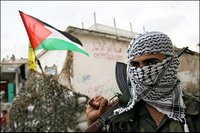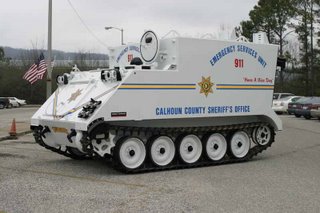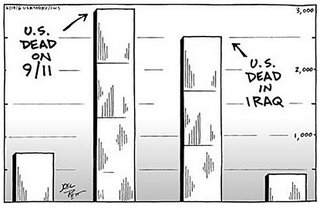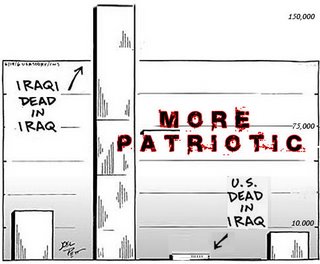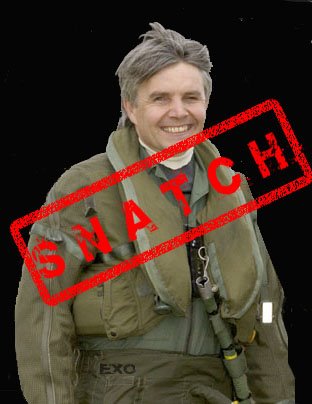IPS - Dahr Jamail and Ali Fadhil
One and a half years after the November 2004 U.S. military assault on Fallujah, residents tell of ongoing suffering, lack of jobs, little reconstruction and continuing violenceThe U.S. military launched Operation Phantom Fury against the city of Fallujah-destroying an estimated 70 percent of the buildings, homes and shops, and killing between 4,000 and 6,000 people, according to the Fallujah-based non-governmental organisation the Study Centre for Human Rights and Democracy (SCHRD).
IPS found that the city remains under draconian biometric security, with retina scans, fingerprinting and X-raying required for anyone entering the city. Fallujah remains an island: not even the residents of the surrounding towns and villages like Karma, Habbaniya, Khalidiya, which fall under Fallujah's administrative jurisdiction, are allowed in.
Security badges are required for anyone wishing to enter the city. To obtain a badge, one has to be a Fallujah native from a certain class. That is, if one is from Fallujah and a government official, a high-class badge of grade G will be issued. Journalists with an X-grade badge will be allowed. Then there are B for businessmen and C for those who have contracts with U.S. military in the city. Last are the R-grade badges, which will not be admitted through the main checkpoint at the west side of the city, and must seek entrance through "second class" checkpoints elsewhere.
Having entered the city through the main checkpoint, the first thing visible is the destroyed homes in the Al-Askari district. Virtually every home in this area has been completely destroyed or seriously damaged.
"I could not rebuild my house again because rebuilding is rather costly nowadays," Walid, a 48-year-old officer with the former Iraqi army, told IPS. With sorrow in his eyes he told of how he built his home six years ago. After the destruction, "They [U.S. Military] paid us 70 percent of the compensation and with the unemployment in the city we spent most of it on food and medicines. Now everybody is waiting for the remaining 30 percent."
Slightly different version of this same story could be told by the hundreds of people who lost their houses in the April and November 2004 bombing campaigns.
Across the Euphrates River from the city sits Fallujah General Hospital. Built in 1964, the hospital was unable to function during either U.S. siege because it was being occupied by the U.S. military.
Doctors were reluctant to talk to IPS unless promised anonymity. "It is more a barn than a hospital and we are not honoured to work in it," said one doctor. "There is a horrible lack of medical supplies and equipment, and the Ministry of Health is not doing much about it," added another doctor, also speaking on condition of anonymity.
When IPS mentioned a new hospital under construction in the city, one of the doctors replied, with irony, that half of the people of Fallujah would be dead before that hospital project was completed. He said an emergency plan for the existing hospital is essential, especially because people are too afraid of seeking medical attention in any of the Baghdad hospitals for fear of being kidnapped and killed by death squads. The situation is further complicated by the fact that Ramadi General Hospital, often used by residents of Fallujah, is no longer accessible due to the ongoing U.S. military siege of that city.
During the interview of the doctors, patients and their companions gathered around and started complaining about "the lack of everything" in the hospital. "You press people always come here and talk to us, but there is no result," said an elderly woman in a challenging tone. "If you put me on television, I will tell the whole world how bad the situation is in this city."
The doctors interviewed, however, did praise the role of some local and international NGOs that had offered help to the hospital on occasion.
The people of Fallujah are struggling to survive amidst skyrocketing unemployment, lack of supplies and ongoing violence in the city. At a grocery market, there was another side to the story. Haji Majeed Al Jumaily, 64, was a blacksmith before his hands weakened. He asked the grocer a dozen times how much an item cost before saying, "I only have 2,000 dinars, less than a dollar and a half, to spend and I don't know what to buy with it. Everything is so expensive and my nine family members must be fed."
He told IPS how his two sons were killed by random gunfire from the new Iraqi army two years ago. "Now I have to take care of their two wives and six children as well as my wife," he said. The market was full of people, but poverty is obvious from the way people wandered about trying to balance what to spend with what they have in hand.
"Unemployment in Fallujah is a major problem that should be handled," commented Jassim Al Muhammadi, a lawyer. "The financial situation is collapsing every day and people do not know what to do. The siege is adding a lot to this problem."
Ali Ahmed, a 17-year-old student, interrupted: "We do not need press releases in this city, sir. What we really need is a solution to the everlasting problem of this city... The Americans and Iraqis in power accused us of terror, killed thousands of us and now they are just talking about reconstruction. Well, they are all thieves who only care for what they can pinch off the Iraqi fortunes. Just tell them to leave us alone as we do not want their fraudulent reconstruction."
Ahmed added that the U.S. military continues to kill and arrest people for any reason whatsoever, and sometimes for no reason.
Infrastructure in Fallujah is just as bad as any other part of Iraq. Water, electricity, cooking gas, fuel, telephone and mobile services are very poor. All of the residents interviewed complained about the government's indifferent attitude towards them. The majority believed it was for sectarian reasons, although some others thought it is the same all over Iraq.
The mayor of Fallujah was not available to interview, but in his latest appearance on television he announced his resignation. In his statement televised on Jun. 14, he declared firmly, "The Americans did not fulfill their promises to me and so I resign."
Similar reports about the situation in Fallujah were made by the United Nations Integrated Regional Information Network (IRIN) on May 21: "there is still slow progress on humanitarian issues, according to local officials."
The report stated that two-thirds of the city's residents had returned, but 15 percent remained displaced in the outskirts of Fallujah, "living in abandoned schools and government buildings."
"Approximately 65,000 people are still displaced out of Fallujah," reported Bassel Mahmoud, director of the city's reconstruction projects.
The IRIN report, similar to what IPS found here, said, "Despite Baghdad allocating 100 million dollars for the city's reconstruction and 180 million dollars for housing compensation, very little can be seen visibly on the streets of Fallujah in terms of reconstruction. There are destroyed buildings on almost every street. Local authorities say about 60 percent of all houses in the city were totally destroyed or seriously damaged and less than 20 percent of them have been repaired so far... Power, water treatment and sewage systems are still not functioning properly and many districts of the city are without potable water."
Residents complained to IPS that they had less than four hours of electricity per day, and there was great frustration that at least 30 percent of the allocated reconstruction funds were shifted to pay for extra checkpoints and security patrols in the city.
And while the residents continue to wait for the promised compensation funds, of the 81 reconstruction projects slated for the city, less than 30 have been completed and many others will most likely be cancelled due to lack of funding, according to a Fallujah council member who spoke with IPS on condition of anonymity.
Current estimates of the amount needed to rebuild Iraq are between 70 and 100 billion dollars. Only 33 percent of the 21 billion dollars originally allocated by the United States for reconstruction remains to be spent. According to a report by the U.S. inspector general for reconstruction in Iraq, officials were unable to say how many planned projects they would complete, nor was there a clear source for the hundreds of millions of dollars a year needed to maintain the projects that had been completed.
As for Fallujah in particular, security has eaten up as much as 25 percent of reconstruction funding, but even more has reportedly been siphoned off by corruption and overcharging by contractors.
Last year, a U.S. congressional inspection team was set up to monitor reconstruction in Iraq. On May 1, they published a scathing report of the failure of U.S. contractors to carry out projects worth hundreds of millions of dollars. The report also noted that nearly nine billion dollars in Iraqi oil revenues which had been disbursed to ministries was "missing."
Link


